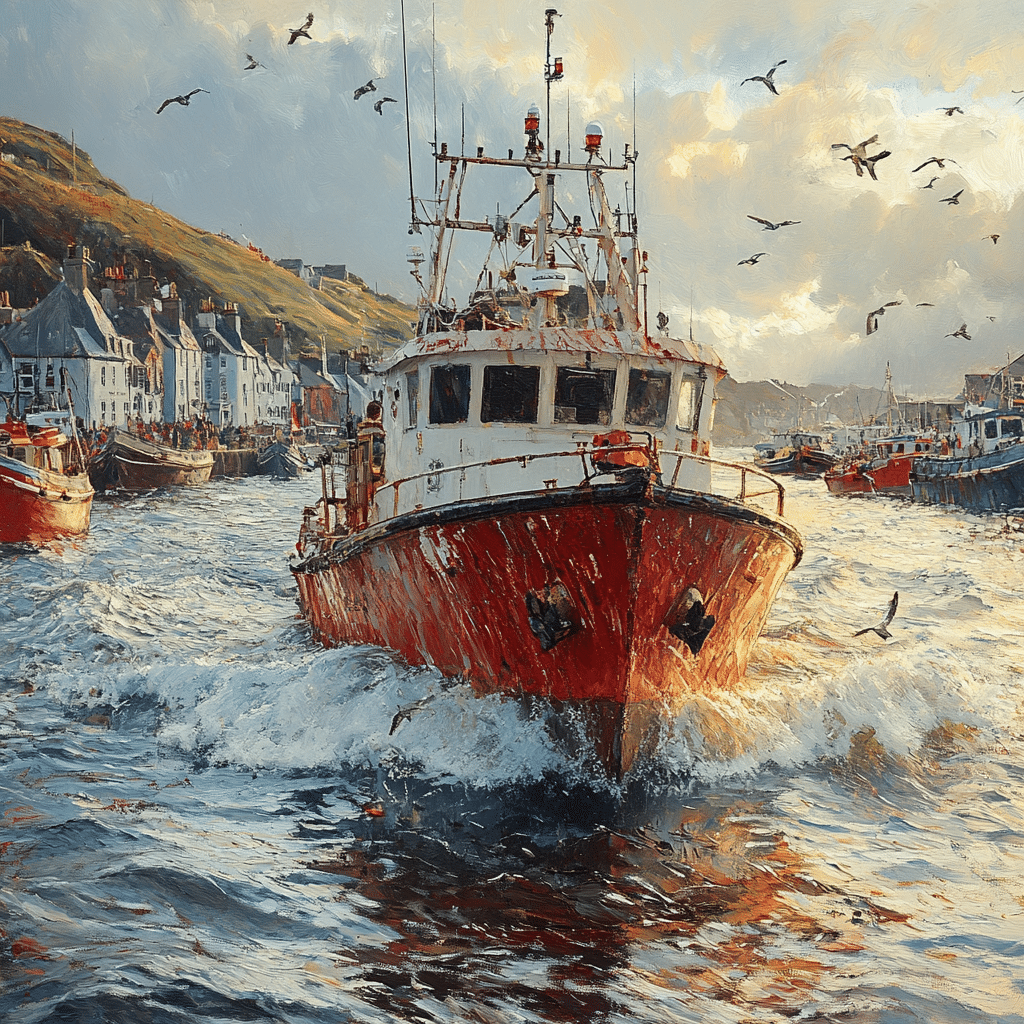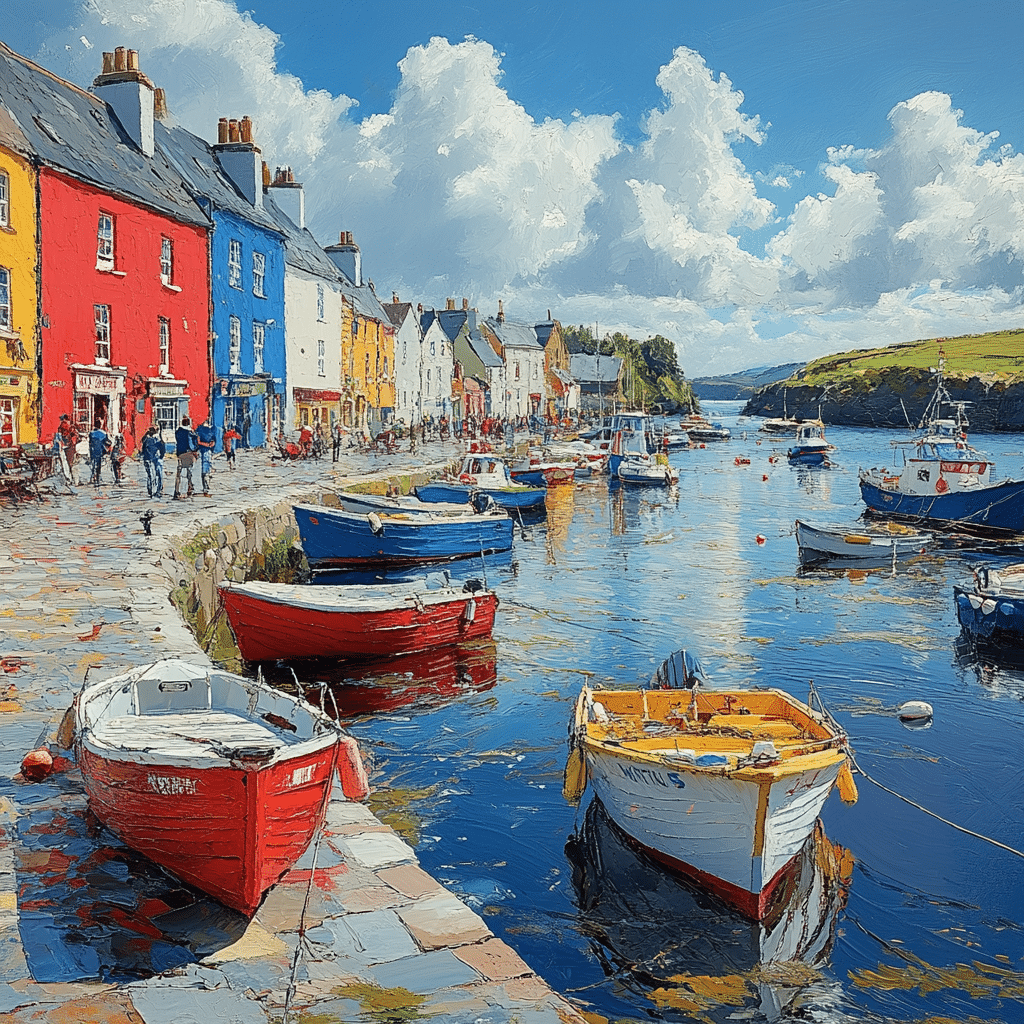The Historical Significance of Killybegs in Maritime Trade
Killybegs has been an integral part of Ireland’s maritime history for centuries. Nestled on the North West Coast of Ireland, this picturesque town started as a humble fishing village and transformed into the country’s most significant fishing port by the 19th century. The harbor, bustling with trawlers, serves as a testament to Killybegs’ legacy, which dates back to the pivotal year of 1588 when it became the last port of call for the Spanish vessel La Girona, part of the fateful Spanish Armada. This historic anchorage highlights Killybegs’ strategic importance during times of conflict and maritime exploration.
Fast forward to the early 20th century, Killybegs experienced a significant economic boom with the advent of mechanized trawlers. This innovation allowed local fishermen to maximize their catch and trade, laying the groundwork for the thriving fishing industry we see today. Notably, during World War II, shipping routes changed dramatically, but Killybegs adapted, solidifying its position as a vital hub for maritime commerce. The town’s continuous evolution showcases how historical events shaped Killybegs and its fishing practices, helping it maintain its pivotal role in Ireland’s economic fabric.
Navigating the local culture, Killybegs boasts a rich heritage that marries its fishing legacy with modern advancements in sustainable practices. The community embraces its past while looking ahead, positioning Killybegs as an essential artery for Ireland’s economic lifeblood. This blend of history, innovation, and tradition makes Killybegs truly the crown jewel of Ireland’s fishing industry.

The Top 7 Reasons Killybegs Leads Ireland’s Fishing Industry
Killybegs stands as a shining example of success in Ireland’s fishing sector for several compelling reasons. Let’s explore the key factors that establish Killybegs as a leader in this industry:
Killybegs has a prime position along the Atlantic Ocean, granting it direct access to abundant fishing grounds. This geographical advantage makes it a magnet for trawlers and fishing fleets seeking rich waters.
The port supports multiple fisheries, including pelagic, demersal, and shellfish varieties. Species like mackerel, herring, and shrimp thrive here, contributing significantly to the local economy.
With an impressive fleet of over 150 registered vessels, including renowned boats such as the An Fiontar and the Janet, Killybegs boasts one of the largest fishing fleets in Ireland. This scale ensures plenty of produce for market demands.
Killybegs has made significant investments in modern facilities like processing plants and cold storage units. These upgrades enhance fish quality and freshness, catering to both local consumers and international markets.
Support from the European Union, including regulations and funding schemes, has bolstered Killybegs’ fishing industry. These initiatives promote sustainable fishing practices while ensuring compliance with international standards.
Local fishermen actively engage in sustainability efforts, embracing initiatives like Irish Fisheries. These projects underscore the importance of responsible fishing practices that protect marine ecosystems for future generations.
Killybegs has become synonymous with high-quality seafood, making its mark in gourmet cuisine. Restaurants like The Thatched House focus on sustainability while offering exquisite seafood dishes that showcase local catches.
Economic Impact: Killybegs’ Contribution to Ireland’s GDP
Killybegs plays a crucial role in Ireland’s economy, generating millions through fishing, processing, and export activities. It’s not just a fishing hub; it’s an economic powerhouse that creates jobs and supports related sectors such as shipping, tourism, and hospitality. Statistical data shows that Killybegs’ fishing sector alone contributes significantly to national GDP.
The multiplier effect of every job in the fishing industry ripples through the community. For instance, a single fisherman’s livelihood directly affects local suppliers, processors, and even service businesses. Numerous success stories highlight local enterprises thriving due to the fishing economy, painting a vibrant picture of Killybegs as a dynamic economic engine for Ireland.
Beyond mere statistics, Killybegs’ fishing industry fosters a strong sense of pride among the community, encouraging residents to invest in its future. With the combination of dedicated fishermen and robust infrastructure, Killybegs is well-positioned to continue driving economic growth for years to come.

Challenges Facing Killybegs’ Fishing Industry
Despite its remarkable success, Killybegs faces several pressing challenges. Climate change is a significant concern, affecting fish stock migration and altering traditional fishing patterns. Local fishermen are constantly adapting to these changes, but unpredictability remains a daunting issue.
In addition to environmental factors, the aftermath of Brexit has created uncertainty regarding trade relations between the Republic of Ireland and the United Kingdom. Export possibilities are now coupled with compliance complexities and new regulations that fishermen must navigate. This new landscape has left many questioning what the future holds for Killybegs’ fishing industry.
Local leaders and fishermen are vocal about these struggles. While they acknowledge the difficulties, they are also optimistic about their resilience and adaptability. As Killybegs faces these hurdles, the community remains committed to finding innovative solutions that balance the needs of the industry with the responsibilities of preserving marine ecosystems.
Future Prospects for Killybegs and Innovation in Fishing Practices
Looking forward, Killybegs can leverage technology to propel its fishing practices into a sustainable future. Innovations such as fish tracking systems and aquaculture are on the rise, promising exciting possibilities for local fishermen. As sustainability becomes a priority, Killybegs is already adopting practices that meet both economic and environmental needs.
One emerging trend is the use of drones for stock assessment. These high-tech devices offer precise data on marine biodiversity, allowing fishermen to make informed decisions about their practices. Apps that track catch data also play a pivotal role, helping fishers ensure they are maintaining sustainable quotas.
As Killybegs embraces these advancements, it sets itself on a course to remain at the forefront of fishing practices globally. The community’s commitment to sustainability and innovation will help solidify Killybegs’ crown jewel status in Ireland’s fishing industry while supporting future generations of fishermen.
Crafting a Vision for Killybegs’ Future in Fishing
Killybegs symbolizes the rich maritime heritage of Ireland, embodying tradition while continuously adapting to modern challenges. As the community prioritizes sustainability alongside technological innovation, Killybegs serves as a model for fishing ports worldwide. The drive to preserve both the economic and environmental aspects of fishing showcases a deep commitment to future generations.
With a strong collective vision, Killybegs not only retains its status as Ireland’s crown jewel in fishing but also paves the way for a thriving economic future. By fostering an enduring partnership between technology and tradition, Killybegs solidifies its place as an essential hub of the fishing industry and an inspiration for communities everywhere.
As this vibrant town continues its journey of growth and responsibility, Killybegs proves that together, it can navigate the shifting tides of global fishing practices with grace and determination.
Killybegs: The Crown Jewel of Ireland’s Fishing Industry
A Little Slice of Maritime History
Did you know that Killybegs is the largest fishing port in Ireland? This bustling fishing town is more than just a hub for catching fish; it’s got a rich history teeming with stories. Fun fact: Killybegs was once a trading post for the famous Spanish Armada! Today, it’s a lively community that welcomes visitors to experience its vibrant maritime culture. You might appreciate the charm of nearby Killyleagh, another picturesque spot in County Down that reflects Ireland’s enchanting coastline.
Fishing and Beyond
Aside from fishing, Killybegs boasts remarkable coastal scenery. The stunning views aren’t just for looks; they draw in tourists year-round. If you’re in the market for a home in this beautiful area, you could explore Grants For home Buyers to help with the purchase. Just picture living steps away from the Atlantic, where the salty breeze keeps things fresh. Exciting, right? Killybegs also has a thriving local economy, supporting various industries beyond fishing, which contribute to the area’s charm and festive atmosphere.
Culture and Community
Killybegs isn’t just about the fish; it’s a hub of community life too! The town organizes several events throughout the year, celebrating local heritage and arts. And speaking of history, don’t miss King House when visiting; it’s a beautifully restored Georgian mansion reflecting the area’s past. On another note, when disposing of unwanted items, it’s interesting to know that locals have their tips, like How To get out Of a lease without much hassle. The community spirit in Killybegs is infectious, making it a place where visitors feel at home.
In conclusion, Killybegs is a treasure trove of facts and stories just waiting to be uncovered. From fishing boats to historic houses, there’s plenty to discover. So next time you’re daydreaming about the Emerald Isle, consider this gem and all it has to offer. Whether you’re delving into maritime lore or enjoying the stunning coastline, Killybegs welcomes you with open arms!

What is Killybegs best known for?
Killybegs is best known as the most important fishing port in Ireland, bustling with trawlers and steeped in maritime history.
Is Killybegs a nice place to live?
Living in Killybegs can be quite nice, especially for those who love the sea and outdoor activities, with its picturesque surroundings and welcoming community.
How much is a taxi from Donegal to Killybegs?
A taxi ride from Donegal to Killybegs takes about 23 minutes and typically costs between $45 and $55.
Is Killybegs in northern or southern Ireland?
Killybegs is located in the western part of Ireland, specifically County Donegal, which is in the Republic of Ireland, not Northern Ireland.
Why is Donegal famous?
Donegal is famous for its stunning landscapes, rugged coastline, and rich Gaelic culture, making it a beautiful spot in Ireland.
What makes Donegal special?
What makes Donegal special is its breathtaking scenery, traditional music, and vibrant communities that really capture the essence of Irish culture.
Is Donegal a safe place to live?
Donegal is considered a safe place to live, with low crime rates and friendly locals, making it feel like a close-knit community.
Is Donegal a disadvantaged area?
While Donegal has faced economic challenges and might be seen as disadvantaged compared to urban areas, it also has a lot to offer and a strong sense of community spirit.
What is the best town to live in Donegal?
The best town to live in Donegal can vary by personal preference, but many people favor Letterkenny for its amenities and vibrant atmosphere.
Why is Donegal so cheap?
Donegal housing prices tend to be lower than in bigger cities, which contributes to the perception that it’s cheap to live there.
Is it expensive to live in Donegal?
Living costs in Donegal can be quite reasonable compared to other parts of Ireland, though prices can vary depending on the location and lifestyle you choose.
Is it safe to drive in Donegal?
Driving in Donegal is generally safe, but be prepared for some narrow and winding roads, especially in rural areas.
What is Killybegs known for?
Killybegs is known for its rich fishing heritage, scenic views, and historical significance, notably as a stop for the Spanish Armada.
Is Killybegs, Ireland worth visiting?
Killybegs is definitely worth visiting if you’re into nature, fishing, and history, or simply want to enjoy the charming coastal vibes.
Why is Donegal not Northern Ireland?
Donegal is not part of Northern Ireland because it belongs to the Republic of Ireland, which is a separate entity that was established in the early 20th century.



